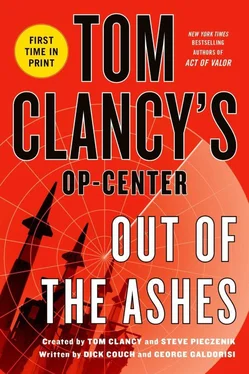“I will determine if and when we fire!” Ghorbani said. He was petrified. He looked down toward Naghidi ’s poorly maintained 76-mm Fajr-27 gun. Can my gun crew even fire in the right direction? I have never taken them to sea and trained them. No one had told me to do that, and I’ve always worried that something bad might happen if I ever had them fire the gun. It might even blow up, and then where would my career be?
Ghorbani scanned his paper for the right phrase. “American naval vessel, you are illegally trespassing in the territorial waters of the Islamic Republic of Iran. You will turn your vessel around and leave our waters immediately. I say this again. American naval vessel, you are illegally trespassing in the territorial waters of the Islamic Republic of Iran. You will turn your vessel around and leave our waters immediately.”
“Captain!” his communications officer pleaded. “If we are going to use our gun then we at least have to light off our fire-control radar and train it toward the American ship.”
Ghorbani was sweating more profusely now and kept removing his ill-fitting battle helmet and mopping his brow with his sodden handkerchief. He knew he looked ridiculous, battle helmet and starched whites. He considered the communications officer for a moment. The man was at least ten years older than he was and had served in the Iranian navy since he was a naval cadet. He had to trust someone.
“Yes, yes, go ahead and do it!”
Sullivan was warily eyeing Naghidi when her ops officer called her from Mustin ’s Combat Direction Center.
“Captain, Ops. The Iranian’s lighting us up with his fire-control radar.”
“Roger, Ops.”
Ghorbani was near panic. Now he shocked his communications officer when he snatched the microphone out of his hand and shouted into it, “American ship. Stop and turn around now or I will be forced to fire on you. Make no mistake; you will not violate the territorial waters of the Islamic Republic of Iran!”
Mustin ’s motto, emblazoned on the ship’s crest, was Toujours L’Audace, “Always Be Bold,” and Commander Jennifer Sullivan did not intend to become the first Mustin commanding officer to soil that crest. Mustin continued to plow ahead and Sullivan pointed her bow directly at the Iranian ship, presenting a bow-on aspect, the smallest target should the Iranian vessel, now less than three miles away, carry out its threat. She had spent enough time in the Gulf to know sometimes the Iranians were long on bluster and short on action, but she was taking no chances.
She called her ducklings on the UHF radio. “ Scout and Ardent, fall into my wake in loose trail. Remain at general quarters and prepare to take evasive action.”
Sullivan mashed the button on her control panel that connected her to Mustin ’s CDC. “TAO, light her up!” she commanded. Her tactical action officer in Mustin ’s Combat Direction Center did the rest. Around CDC, officers and sailors went through their well-rehearsed procedures, engaging the fire-control radars for Mustin ’s RIM-66 Standard medium-range antisurface missiles as well for her five-inch Mk 45 Mod 4 gun.
Inside Mustin ’s Mk 41 Vertical Launching System, six RIM-66 missiles spun up, while on her bow, her five-inch gun moved imperceptibly in Naghidi ’s direction.
Sullivan punched another button on her radio panel. “Papa Tango, this is Yankee Oscar. I need to speak with Alpha Bravo now!”
Within seconds, Commodore Joe Armao was on the line. “What you got, Captain? We’ve been listening to the VHF nets and your conversation with the Iranian ship.”
“Roger, Commodore. My rules of engagement tell me I can engage this guy if he fires at me or at Scout or Ardent, but you’re the mission commander, sir. You can override me.”
“No override, Captain. Follow your ROE. Alpha Bravo, out.”
Sullivan slowed her approach toward the Iranian ship from ten to five knots. She needed time and she somehow knew her opposite number aboard the Iranian corvette also needed time. They were now firmly in Iranian territorial waters. It’s not an issue of who blinks, she told herself, but I have no choice but to protect my ship.
Aboard Naghidi, Ghorbani’s communications officer, still at his side, picked up the phone, listened for only a few seconds, then slammed the receiver down and said, “Captain, the Americans are lighting us up with their fire-control radar!”
Ghorbani stood frozen. Time stood still. All eyes were on him.
“Captain!” the communications officer pleaded. “We have our orders … from the admiral!”
The word “admiral,” knowing the man was referring to his patron, triggered something in Ghorbani. He looked directly at the communications officer, deepened his voice as much as he could, and commanded, “Fire a shot across the American’s bow.”
The order went from the communications officer, to Naghidi ’s combat center, to the gun officer on the bow, to his lead gun crewman. There was a frenzy of activity as his gun crew trained the gun on Mustin .
On Naghidi ’s bridge, Ghorbani became agitated when he saw nothing happening. “Fire, fire, fire!” he shouted. The order was passed again. Seconds passed. Still nothing. “Fire, by all that is holy, fire, fire, fire!” Ghorbani shouted at the top of his lungs.
Suddenly, a shot rang out and a puff of smoke followed closely behind the 76-mm projectile. Fifteen seconds later, another shot and another puff of smoke. Another twenty seconds, another shot. The panicked gun crew, hearing the order to fire passed multiple times, tried to comply with what they thought their captain’s wishes were.
Aboard Mustin, Commander Sullivan had her bridge glasses trained on the Iranian ship. She saw the smoke from Naghidi ’s gun and the splash from the fall of shot of the first shell, well to starboard. Sullivan was considering her options when she saw the second puff of smoke.
“Take him with guns,” Sullivan commanded.
Naghidi was presenting its beam to Mustin as Mustin ’s five-inch Mk 45 Mod 4 gun began to spit seventy-pound shells at the Iranian ship. The first round took the corvette amidships. The Mk 45 Mod 4 gun can deliver five-inch projectiles at its maximum rate of twenty rounds per minute. In that first minute, fifteen rounds hit Naghidi. In three minutes, it was racked with explosions and reduced to a smoking hulk.
“Cease fire,” Sullivan commanded. “Officer of the Deck, steam ahead and look for survivors. Order Scout and Ardent to do the same thing. Get the RIB ready for survivor pickup.”
“Aye, aye, Captain.”
Then an eerie silence fell over Mustin ’s bridge. It had been a one-sided fight and everyone knew it. They also knew there would be few survivors.
* * *
The engagement and Mustin ’s sinking of Naghidi made international news for several days. This battle was linked to Iran’s closing of the Strait of Hormuz, and ultimately, a justified action on the part of the United States to keep the waterway open. However, at sea there was work to be done. Mustin, Scout, and Ardent had recovered almost two dozen Iranian sailors. Medics aboard those three ships, as well as doctors aboard Ponce and Truman, did what they could for those critically injured. As these sailors were released from medical care they were flown to Bandar Abbas and turned over to Iranian authorities. The rescued crewmen were treated with great courtesy and respect. Less than twenty-four hours after the incident, IRNA, the Islamic Republic News Agency, had broadcast a report, saying, “The captain of the Naghidi acted completely without authority and in contravention to the peaceful intentions of the Islamic Republic of Iran.” Commodore Joe Armao had the remaining Iranian mines cleared within three more days and Ponce steamed back to Bahrain with her mine-countermeasures ships. The Truman strike group and other U.S. Navy ships steamed out of the Arabian Gulf and into the Gulf of Oman.
Читать дальше












